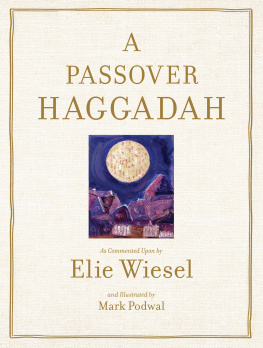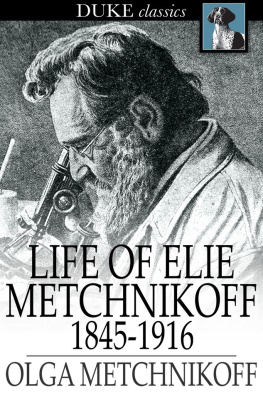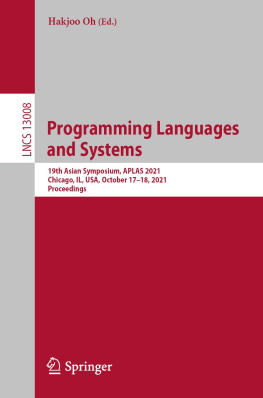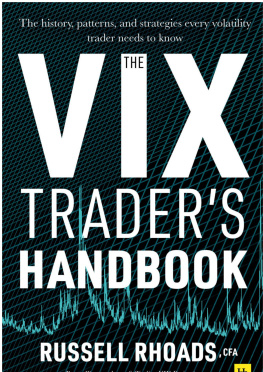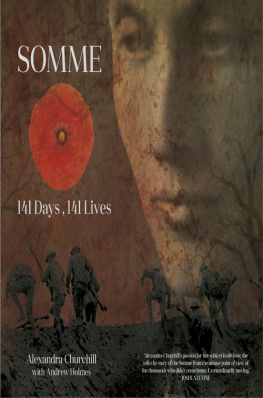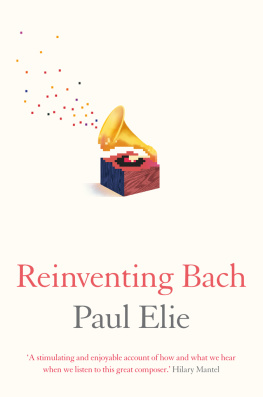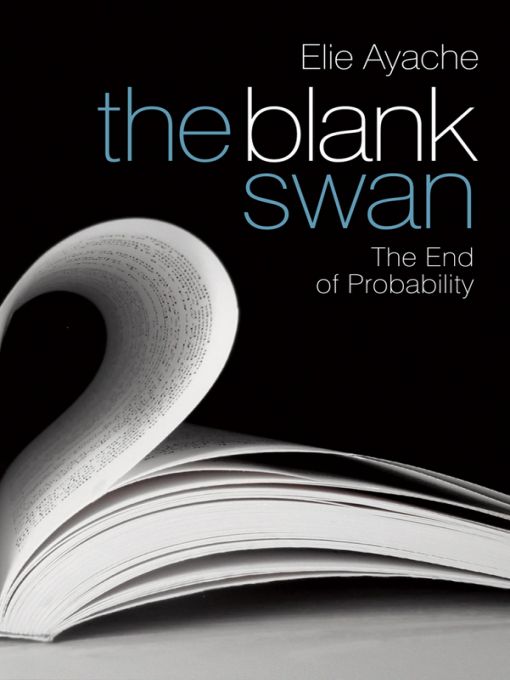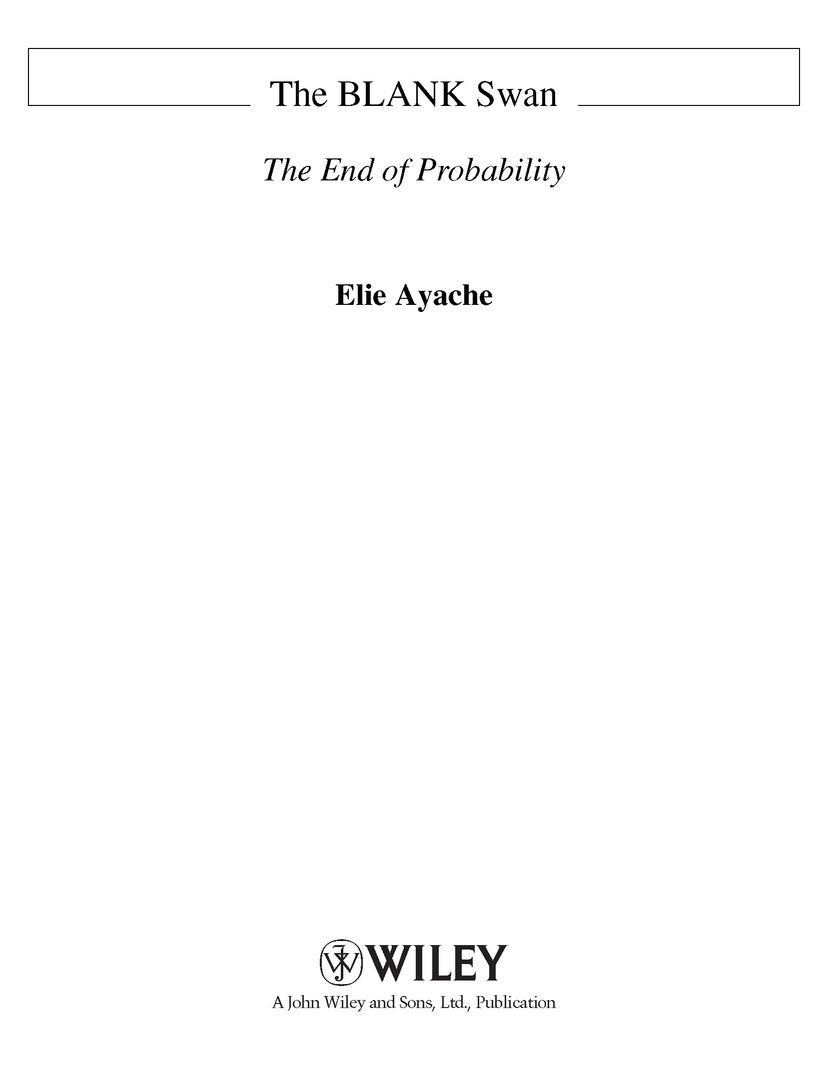Table of Contents
To serge, without whom not
The subject is immense,
requiring every order of knowledge and endless information.
Besides, when such a complex whole is in question,
the difficulty of reconstructing the past,
even the recent past,
is altogether comparable to that of constructing the future,
even the near future;
or rather, they are the same difficulty.
The prophet is in the same boat as the historian.
Let us leave them there.
Paul Valry
The necessary book is subtracted from chance.
Maurice Blanchot
Introduction
This is a book about writing, pricing and contingent claims. I hold that the writing process and the pricing process are two special kinds of processes that do not take place in possibility or in probability, like the traditional stochastic processes. They fall completely outside prediction. As processes, they keep re-creating themselves and differentiating themselves, yet they do not unfold in chronological time. For this reason, their Swan bird, or the event that gives them wings, is BLANK. It is neither Black nor White; it is neither loaded with improbability nor with probability. It can only be filled with writing, as when we say to fill in the blanks.
Likewise, the medium of contingent claims - that which transmits them and translates them into prices - is something I call the market. This cannot be covered by probability theory or derivative valuation theory. The medium is of the nature of writing, and the trader of contingent claims is a writer and a creator. He doesnt predict the market (or its generalization, which is history) or try to anticipate it. The market is his work, as when we say that the book is the work of the writer or the poem is the work of the poet.
It was during the period in which I was an option market-maker on the floors of LIFFE (London International Financial Futures Exchange), in 1990-95, and MATIF (March Terme International de France), in 1987-90, that I learnt what it really meant to be a market-maker, or a local (as we say), and how far the open outcry market (which is the only true form of market to my eyes and the only place where contingency, as a meta-probability, can truly strike) can be from the masquerade and total degeneration of probability to which we were recently led by the Collateralized Debt Obligation (CDO) blunder and the subsequent rout, and will be led by any other form of complex derivative that we cannot calibrate to the market. I believe this whole branch is going to drop off the tree, and the only way to reconstruct a market and return to the market is to go back to the place (and probably the times) where individuals (locals) make the market, as opposed to big institutional players who never understood how to make money in the market in the first place.
Probability theory is bad for the market as it eventually leads to the metaphysical extremity of the CDO and to the blanket rejection of all probability models by someone like Nassim Taleb, author of The Black Swan. I think the real intellectual scandal that the whole culture of the market is facing today is that traditional financial theory can only understand profit in the market through an imperfection of some kind or other: either by an arbitrage opportunity, or asymmetric information, or monopoly, or Knightian essential uncertainty, etc. (not to mention sheer luck). What is lacking is an account of how to make money in the market as a perfect medium of contingency, not as an imperfect case of probability theory.
Apart from rebuilding a market that may emerge as a true vehicle of speculation (in the good, almost philosophical sense of the world), i.e. as technology of the future, I believe that a critique like the one I undertake in this book can revolutionize the philosophy of probability. Indeed, it is not in probability (or worse, by luck) that money shall be made in the market, but outside probability, in a medium and continuum that I can find no better way to describe than to compare it with the medium of the creation of literary work.
The reason why my book is called The BLANK Swan is that it is not the opposite of The Black Swan as a hasty critic of Talebs book would tend to think. The White Swan would be the opposite of The Black Swan and Nassim himself, in a characteristically witty passage of his own book, considers the possibility that somebody some day would write a diatribe against him with the title The White Swan.
My book is not a direct criticism of Nassims; therefore it is not opposed to it in colour. Rather, it criticizes the whole background or framework of thought in which one would assume that Black Swan and White Swan are opposed to each other.
The Black Swan is the perfectly unexpected event; the White Swan is the perfectly expected event. Underlying both is the category of prediction and prevision, which is the real object of my criticism. The Black Swan refers to something we cannot see or foresee (it is black) and the White Swan to something evident and clear. Although opposed, the two are predicated on the idea of content of vision, or content of mind, or content of expectation.
My observation is that Black Swans are said to be unpredictable only insofar as the framework and whole register of prediction is maintained. For instance, Nassims book is crammed with the framework of prevision, only he argues that there is something - the Black Swan - that typically evades that framework. My criticism consists in suggesting that if Black Swans constantly evade prevision, as Nassim warns us, then we should be able to define them and deal with them completely independently of prevision. Why even keep the framework of prevision when we keep talking of something that constantly evades it?
Like I said, Nassim has to maintain this framework (of prevision) because this is the stuff his book is made of, or the stuffing his bird is filled with, only negatively so. In other words, they are full of prevision, only Nassim constantly argues against it. What would become of Nassims book and the whole concept if prevision was eliminated altogether? What if we completely eliminated the content of vision, i.e. both the colours White and Black? What if we eliminated the whole context of colour and of content? Hence the BLANK Swan.
It is not with prevision (either of Black or White) or prediction that we should deal with the Black Swan or define it, but with something else, which, in the course of my book, turns out to be writing and whose quantitative avatar is the market. Writing is something we produce without previous knowledge or prevision or prediction. Writing is quicker than thought and vision. It is a material process, when vision and prevision are only conceptual. Writing transpierces the page it is marked on. It is real. It is a process that eventually transports us to the future, making us attain and fulfil our promises (think of the derivative payoff as a promise that the seller of the derivative has written to the buyer), yet at no point is it based on prediction or forecast.
The market, whose other name is the pricing process, is such a process. Hence my idea is that the market (or writing) should be the way we deal with Black Swans, not the place where we complain helplessly against them (as Taleb does).


